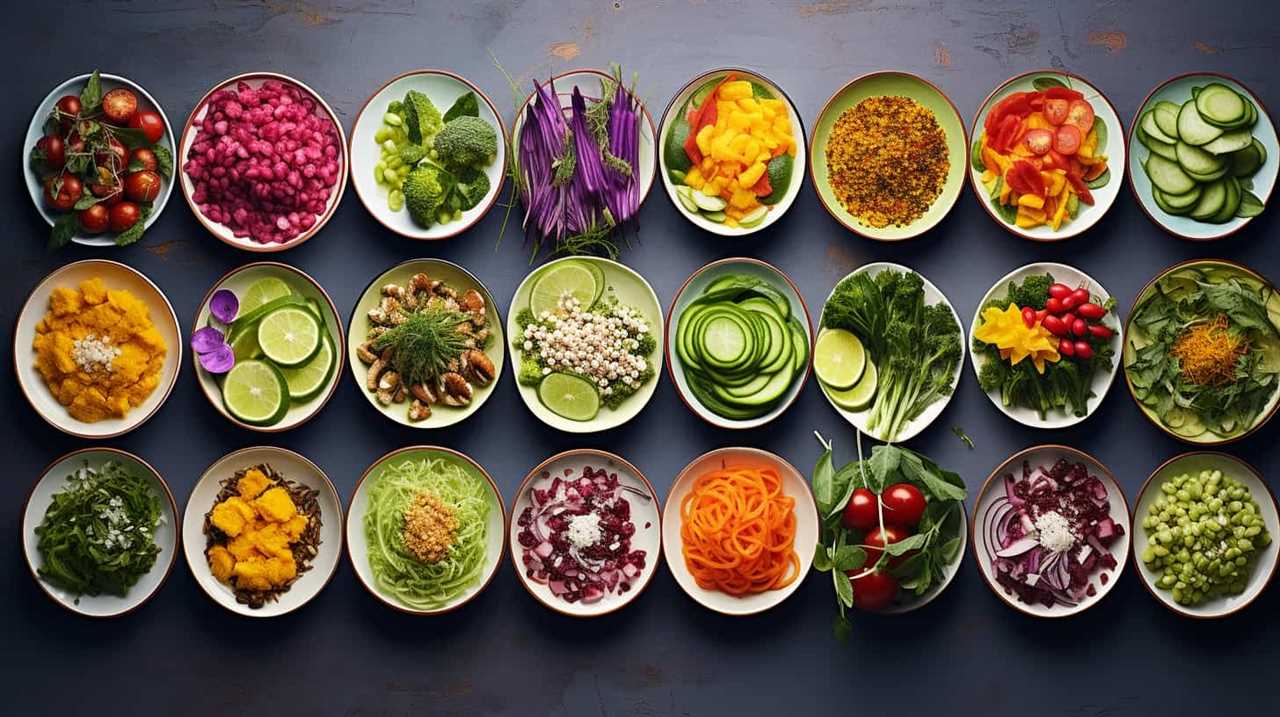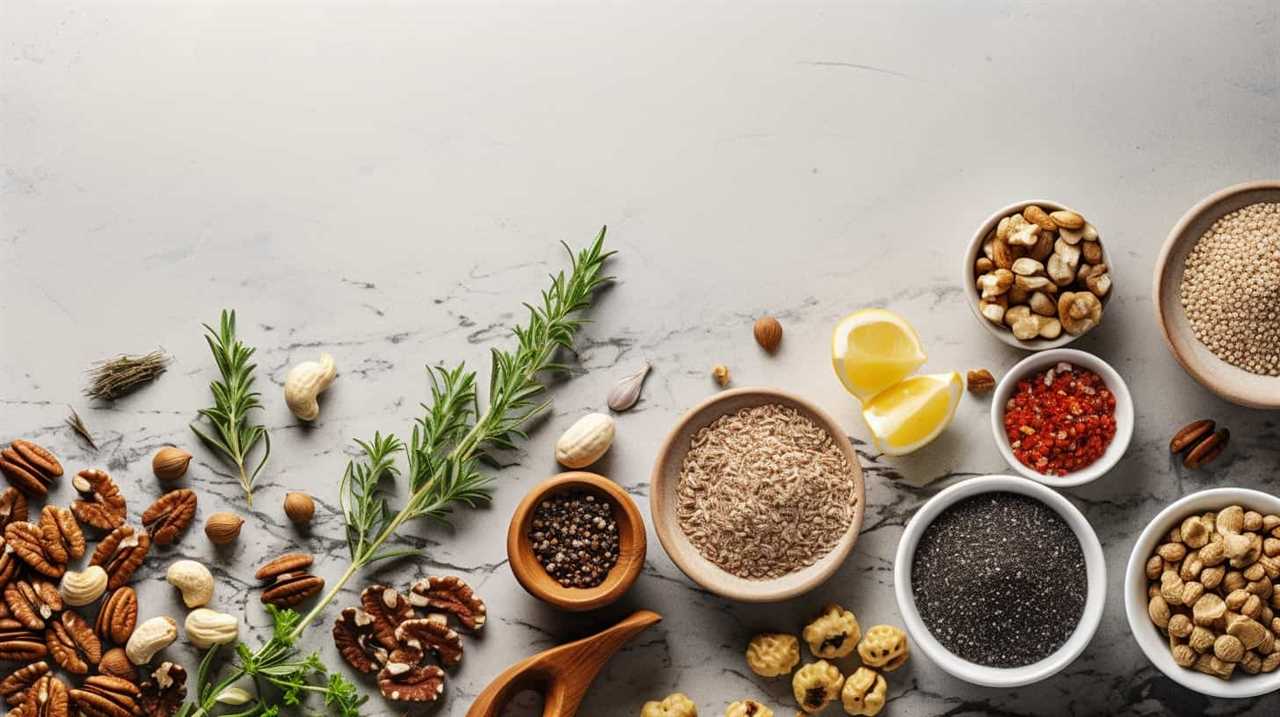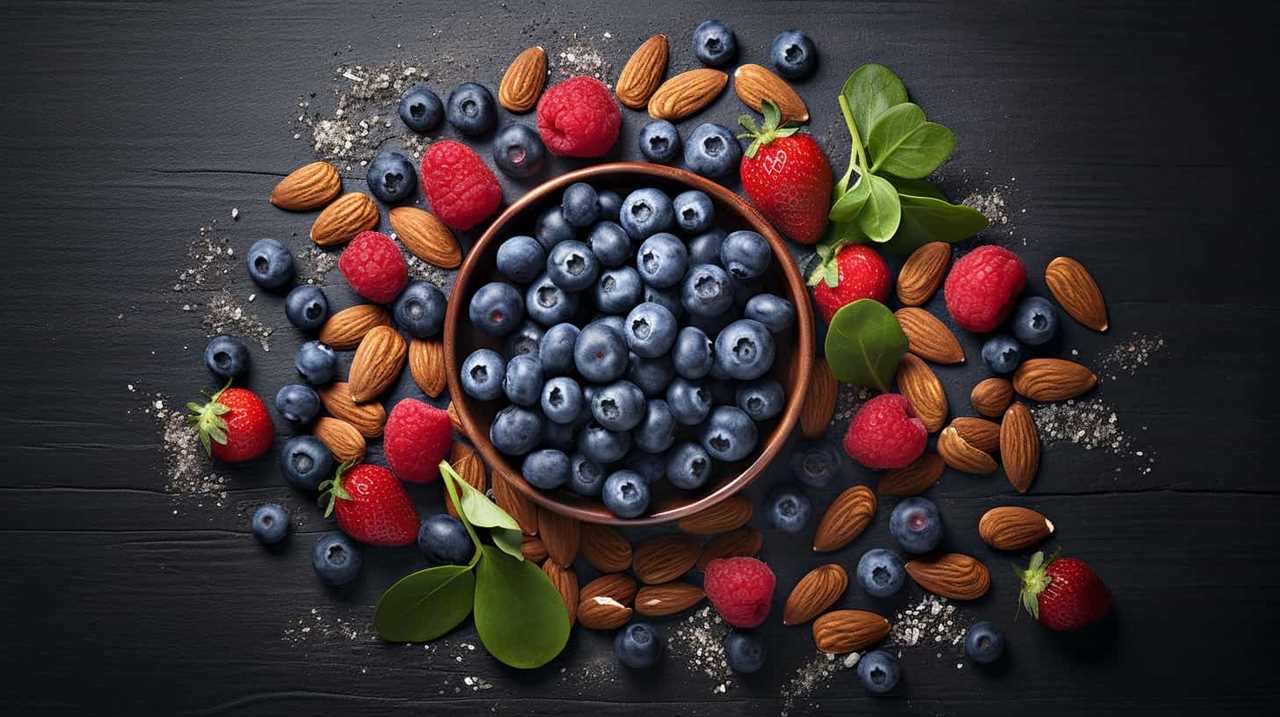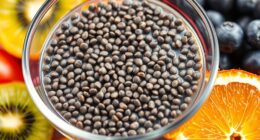Did you know that while chia seeds are often praised as a superfood, they may actually have some health risks? This article will explore the potential dangers of consuming chia seeds and the significance of being mindful of these risks.
From allergic reactions to digestive issues and even potential choking hazards, there are several factors to consider.
Additionally, we will discuss how chia seeds might interact with medications and their impact on blood pressure.
Stay informed and protect your well-being.

Key Takeaways
- Chia seeds can trigger allergic reactions in individuals with allergies to mustard, sesame, or kiwi.
- Chia seeds can cause digestive discomfort, including diarrhea and constipation.
- Chia seeds can pose a choking hazard, especially without enough liquid.
- Chia seeds’ high fiber content can affect the absorption and effectiveness of certain medications.
Allergic Reactions
Allergic reactions to chia seeds can present serious health risks. Some individuals may experience an adverse immune response when consuming chia seeds due to cross-reactivity with other allergens. Cross-reactivity occurs when the immune system recognizes similar proteins in different substances and triggers an allergic reaction.
For example, individuals with allergies to mustard, sesame, or kiwi may also be at risk of developing an allergic reaction to chia seeds. These reactions can range from mild symptoms like itching and hives to more severe anaphylactic reactions, which can be life-threatening.
It’s important for individuals with known allergies to be cautious when consuming chia seeds and to seek immediate medical attention if any symptoms of an allergic reaction occur.
Digestive Issues
Occasionally, we may experience digestive issues when consuming chia seeds. While chia seeds are generally well-tolerated, some individuals may be more sensitive to their high fiber content, which can lead to digestive discomfort. The most common digestive issues associated with chia seeds include diarrhea and constipation.

| Digestive Issues | Causes | Risks |
|---|---|---|
| Diarrhea | Chia seeds absorb liquid and form a gel-like substance in the digestive system, which can speed up bowel movements and result in loose stools. | Dehydration and electrolyte imbalances may occur if diarrhea is severe or prolonged. |
| Constipation | In some cases, chia seeds may absorb too much liquid in the digestive system, leading to slower bowel movements and difficulty passing stools. | Chronic constipation can cause discomfort, bloating, and other digestive problems. |
If you experience digestive issues after consuming chia seeds, it is advisable to reduce your intake or consult a healthcare professional for personalized advice. Remember to stay hydrated and listen to your body’s needs.
Potential Choking Hazard
Chia seeds can present a potential choking hazard, especially when consumed without adequate liquid. These tiny seeds have a gelatinous texture when they come into contact with liquid, which can make them sticky and clump together. If swallowed without enough liquid, they can expand and form a gel-like mass in the throat, blocking the passage of air.
To prevent choking, it’s important to consume chia seeds with plenty of liquid, such as water, juice, or milk. Additionally, if you or someone else experiences choking, the Heimlich maneuver or back blows can be used to dislodge the obstruction.
If you’re concerned about the choking risk, there are alternative uses for chia seeds, such as grinding them into a powder or using them in recipes where they’re soaked or cooked.

Blood Pressure Concerns
Moving on to the next health concern related to chia seeds, we need to address the potential impact on our blood pressure. Chia seeds have gained popularity due to their numerous health benefits, but it’s important to consider how they may affect individuals with hypertension risks or cardiovascular issues. Here are three key points to understand:
-
Blood pressure regulation: Chia seeds contain omega-3 fatty acids, which have been linked to reduced blood pressure levels. However, more research is needed to fully understand the extent of this effect and its long-term implications.
-
Sodium content: Chia seeds are naturally low in sodium, which is beneficial for those with high blood pressure. However, it’s crucial to monitor the overall sodium intake from other sources to maintain a balanced diet.
-
Individual variations: Each person’s response to chia seeds may vary, depending on their overall health, medication use, and genetic factors. It’s advisable to consult with a healthcare professional before incorporating chia seeds into your diet if you have any concerns about your blood pressure or cardiovascular health.

Interactions With Medications
When considering the potential health risks of chia seeds, it’s important to be aware of their potential interactions with medications. Chia seeds are known for their high fiber content and ability to absorb liquid, which can affect the absorption and effectiveness of certain medications.
Some medications require a specific pH level in the stomach for optimal absorption, and the high fiber content of chia seeds can alter this balance. Additionally, chia seeds may interact with blood thinners, such as warfarin, due to their omega-3 fatty acid content and potential to affect blood clotting.
It’s crucial to consult with a healthcare professional or pharmacist before incorporating chia seeds into your diet if you’re taking any medications, to ensure there are no potential drug interactions or medication contraindications.
Frequently Asked Questions
Can Chia Seeds Cause Skin Rashes or Hives in Individuals With Allergies?
Skin reactions, such as rashes or hives, can occur in individuals with allergies to chia seeds. Allergic reactions are possible due to proteins in the seeds. It’s important to be aware of any potential allergies before consuming chia seeds.

Are There Any Specific Digestive Issues That Can Occur After Consuming Chia Seeds?
When it comes to chia seeds, we often wonder about the specific health benefits they offer and any potential side effects. Let’s explore if there are any digestive issues that can occur after consuming chia seeds.
Can Chia Seeds Pose a Potential Choking Hazard, Especially for Children or the Elderly?
Chia seeds can pose potential choking hazards, particularly for children and the elderly. It’s important to be cautious when consuming these tiny seeds, as they can expand and become sticky when mixed with liquid.
Are There Any Concerns Regarding Chia Seeds and Blood Pressure Levels?
Chia seeds can have an impact on blood pressure levels, which is a concern for cardiovascular health and overall well-being. It’s important to understand the potential risks and consult with a healthcare professional.
Do Chia Seeds Interact With Any Commonly Used Medications, and if So, What Are the Potential Consequences?
We should be aware of potential interactions between chia seeds and blood thinners, as well as their impact on blood sugar levels. These interactions can have consequences for our health, so it’s important to consult with a healthcare professional.

Conclusion
Chia seeds may seem harmless, but beware! These tiny powerhouses can pack a punch when it comes to health risks. From triggering allergies to causing digestive issues, they aren’t to be taken lightly.
And let’s not forget the potential choking hazard they pose. Even blood pressure concerns and interactions with medications can come into play.
So, before you jump on the chia seed bandwagon, weigh the risks and consult your doctor.
Stay safe, folks!










